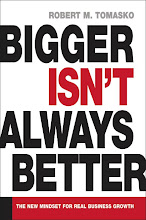February 07, 2006
Is a bigger executive paycheck a better one?
It may be, provided the company's other constituents also fairly benefit. That's one way of looking at it.
But what if the pay lifts into the stratosphere because of something the executives had no influence over? Each dollar increase in the price of oil – from, say, the Iraq War and soaring demand in China - drives up Exxon Mobil’s earnings by 1.5%. And earnings growth drives many executive pay packages.
Gretchen Morgenson (in her Feb 5, 2006 New York Times column) observes:
Free rides may be nice if you’re the passenger. Just don’t confuse them with real growth. The work-around for this is simple: don't base bonuses on absolute performance. Set them in comparison to how others in the same industry are performing. Pay for moving ahead of the pack, not just riding the rising tide. This might incentivize actual forward movement, not just sitting in the right place at the right time.
But what if the pay lifts into the stratosphere because of something the executives had no influence over? Each dollar increase in the price of oil – from, say, the Iraq War and soaring demand in China - drives up Exxon Mobil’s earnings by 1.5%. And earnings growth drives many executive pay packages.
Gretchen Morgenson (in her Feb 5, 2006 New York Times column) observes:
“When a company does well mostly because of a rising commodity price rather than managerial genius, pay-for-performance becomes an unfunny joke.”
Free rides may be nice if you’re the passenger. Just don’t confuse them with real growth. The work-around for this is simple: don't base bonuses on absolute performance. Set them in comparison to how others in the same industry are performing. Pay for moving ahead of the pack, not just riding the rising tide. This might incentivize actual forward movement, not just sitting in the right place at the right time.
